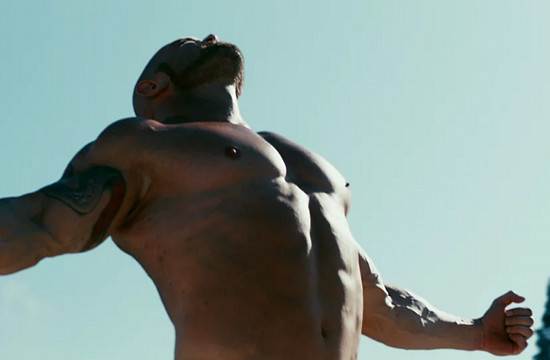
Your Shot: Kim Gehrig on Diving Deep into Modern Day, Masculine Pressures

On trips back to her homeland of Australia (she lives in London these days), something kept striking Kim Gehrig. The Somesuch director couldn’t help but notice how much bigger young men were becoming, not with fat but with huge, pumped-up muscles, appearing to conform to some kind of societal pressure. Around the same time, the ‘king hit’ - the act of throwing a single punch at an unsuspecting victim - had become an epidemic in Sydney, and the news was filled with the tragic stories of young men dying after falling victim to the prank.
Kim felt compelled to make a film on the subject matter, to lend a female gaze to an inherently male issue. She had no interest in passing any judgement - she wanted to understand what it’s like to be a young male growing up in a culture with such specific expectation on what it means to be a man - strong, tough, unemotional, dominant.
This music video - the song is a cover by Kirin J Callinan of Divine’s gay anthem ‘You Think You’re a Man’ - is the result of her endeavour. LBB’s Addison Capper caught up with her to find out more.
LBB> You’d wanted to make a film about masculinity for some time - when did it first hit you that you wanted to shoot it to this song and why?
KG> When I first thought about making this film, the song just came into my head from somewhere deep in my subconscious. I remembered it from my youth. It must have been played a lot on the radio in Australia as I seem to know every word by heart. So when I started writing a script, the words ‘You think you a man, you are only a boy…’ kept humming around my head. I was really interested in the idea that boys can feel that they need to fulfil some ideal of ‘being a man’ and the notion of being ‘man enough’ was something I wanted to explore… So the lyrics felt an interesting way of expressing that ‘You weren’t man enough (to satisfy me)’. I was entirely aware this song was a gay anthem, but I thought that the lyrics could explore more than the story they were initially written to tell.
LBB> When did the relationship with Kirin come about and why was he right to record this version?
KG> Very early on Kirin’s name kept coming up as an artist who was maverick and interested in inspecting masculinity. A friend showed me him. And I just loved his stuff. It took a while to get it all together but when Kirin took on the project and did his cover, I was truly blown away. I hadn’t shown him pictures and I hadn’t really briefed him. He just got it. He landed the soul of what I wanted to explore, a kind of male angst.
LBB> A lot of the narrative is inspired by trips back to your home city of Sydney - can you tell us what you were seeing and why you felt compelled to make a film about it?
KG> It’s really funny when you are away from your home for a long time and then return, as you can really ‘see’ things you maybe don’t notice when you are living amongst them. I was first struck by the series of ‘one punch’ attacks that were all over the papers summer after summer. Kids being knocked out on nights out and dying. There were so many that it seemed almost like a sport. And knowing Australia's obsession with sport I wondered... I looked around and on the beach, the men just looked huge. Bigger than I remembered. With that strength, no wonder people were being knocked out. But that strength seemed to be caught up in image. The image of strength seemed as important as knowing what to do with it. Having grown up in Australia I was very aware of the ‘man up’ culture, and it fascinated me in this context. At the time there were many, many articles about the violence around and I’ll never forget reading a piece that spoke about the problem not only being drink related but related to how we raise our boys. That article was really the beginning of the idea.
LBB> Did you shoot in Sydney too? What are the locations?
KG> The film was shot in Sydney over two days. In the suburbs, on Coogee beach and on Oxford Street inside and outside the old DCM.
LBB> What were your main aims when setting out to shoot this?
KG> I wanted to make a piece that didn’t pass any judgement on anyone, but simply explored some of the things that young men face and have to deal with. I wanted to make a film that had some empathy with what was going on.
LBB> It all flicks between three stages of life - what inspired each stage and the happenings in each of them?
KG> The ‘present’ with the oldest character was inspired by all the real CCTV footage I had seen of ‘one punch’ attacks. The teenage beach scene where he gets bigger and bigger was inspired by my own observations down at the beach. The child story was inspired by my memories of being a kid where bullies would throw eggs at other kids or people’s houses, which I always thought was pretty gross.
LBB> What were your aims with the grade and overall aesthetic?
KG> I shot with an amazing young DP called Ryley Brown. He used very little lighting and we tried to go for something quite honest and raw. I wanted there to be a real contrast between the darker brooding images and the bright glaring scenes in the Australian sun. I almost wanted your eyes to hurt between the extremes of dark and light.
LBB> It’s such a character driven story - how was the casting process?
KG> Fortunately I was working with Citizen Jane, and she is brilliant at street casting. When Pep came in I knew it was him. He was very open and honest about gym culture and the way guys use steroids. He was a great collaborator.
LBB> I can’t speak for around the world but in the UK the conversation around issues of masculinity is quite a big topic right now, with suicide being the biggest killer of men aged between 20 and 49. Do you feel that there needs to more done to address this and more talk around it?
KG> Yes, I do. In the UK male suicide is a huge issue, as it is in Australia. I think the more we can explore and expose the societal pressures on men the better. This film was a small gesture towards that.













